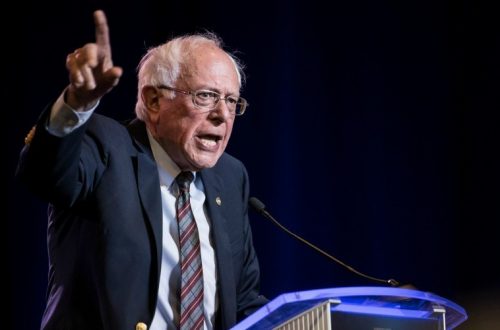After a disastrous effort to boost employment and revenue through massive tax cuts for the well-to-do (you know, the way conservatives say is supposed to happen), Republican Gov. Sam Brownback of Kansas and the Republican-controlled state legislature are scurrying to plug the resulting budget gap.
Brownback and other Republican officials hoped that more generous policies would stimulate the economy, bringing more revenue into the state’s coffers and making up the difference on the bottom line.
It didn’t work. Kansas’s economy has kept expanding at more or less same plodding pace as the rest of the country. And now, according to official estimates…, the state will have at least a $143 million budget shortfall in 2016, and likely more. Lawmakers are looking for a way to plug the hole.
One thing they’re not considering: asking the wealthy to chip in. Instead, in a legislature that last week barred welfare recipients from using their benefits to go swimming or watch movies, the proposals that look most likely to succeed are sales and excise taxes that would be paid disproportionately by Kansas’s poor and working class.
…..
Poor and working-class Kansans already carry a heavy burden under the state’s tax system, compared to people of modest incomes in most other states. Among the fifth of the Kansas population with the lowest incomes, the average person pays 11.1 percent of what they make in state and local taxes, including sales taxes. Among the wealthiest one in every 100 Kansans, the average tax bill is just 3.6 percent of annual income, according to a recent report from the Institute on Taxation and Economic Policy.
Apparently, however, things still weren’t quite hard enough for down-on-their-luck Kansans. So the legislature voted to limit how much cash welfare beneficiaries can receive, effectively reducing their overall benefits.
Max Ehrenfreund of the Washington Post writes:
The legislature placed a daily cap of $25 on cash withdrawals beginning July 1, which will force beneficiaries to make more frequent trips to the ATM to withdraw money from the debit cards used to pay public assistance benefits.
Since there’s a fee for every withdrawal, the limit means that some families will get substantially less money.
It’s hard to overstate the significance of this action. Many households without enough money to maintain a minimum balance in a conventional checking account will pay their rent and their utility bills in cash. A single mother with two children seeking to withdraw just $200 in cash could incur $30 or more in fees, which is a big chunk of the roughly $400 such a family would receive under the program in Kansas.
…..
Since most banking machines are stocked only with $20 bills, the $25 limit is effectively a $20 limit. A family seeking to withdraw even $200 in cash would have to visit an ATM 10 times a month, a real burden for a parent who might not have a car and might not live in a neighborhood where ATMs are easy to find.
Writing in the 1940s, the great newspaper critic A.J. Liebling noted:
There is no concept more generally cherished by publishers than that of the Undeserving Poor… [T]he governing factor in most newspapers’ attitudes toward the mass of people out of luck is the tax rate. One way to rationalize the inadequacy of public aid is to blackguard the poor by saying they have concealed assets, or bad character, or both.
This tradition is carried on today by Fox News and similar media outlets.
In the 1930s George Orwell (in The Road to Wigan Pier) noted a similar attitude toward the less fortunate by the late English scholar George Saintsbury.
Saintsbury was a very learned man and along certain lines a judicious literary critic, but when he talked of political or economic matters he only differed from the rest of his class by the fact that he was too thick-skinned and had been born too early to see any reason for pretending to common decency. According to Saintsbury, unemployment insurance was simply ’contributing to the support of lazy ne’er-do-weels’, and the whole trade union movement was no more than a kind of organized mendicancy:
’Pauper’ is almost actionable now, is it not, when used as a word? Though to be paupers, in the sense of being wholly or partly supported at the expense of other people, is the ardent, and to a considerable extent achieved, aspiration of a large proportion of our population, and of an entire political party.
Orwell offers another quote from Saintsbury:
Even the ’right to live’ …extends no further than the right to protection against murder. Charity certainly will, morality possibly may, and public utility perhaps ought to add to this protection supererogatory provision for continuance of life; but it is questionable whether strict justice demands it.
Orwell aptly observes:
It takes a lot of guts to be openly such a skunk as that.
Some Kansas Republicans seem to share Saintsbury’s contempt for the poor while lacking the guts to be as open about it.


